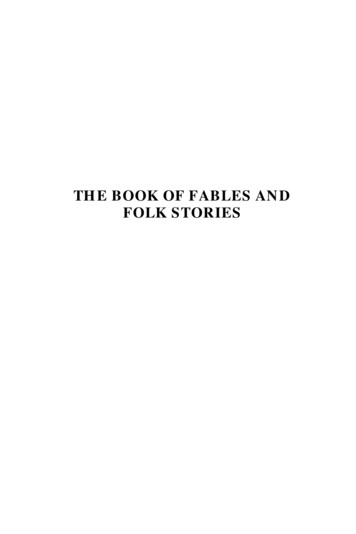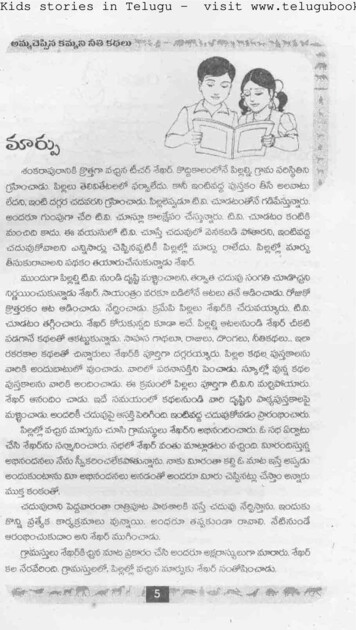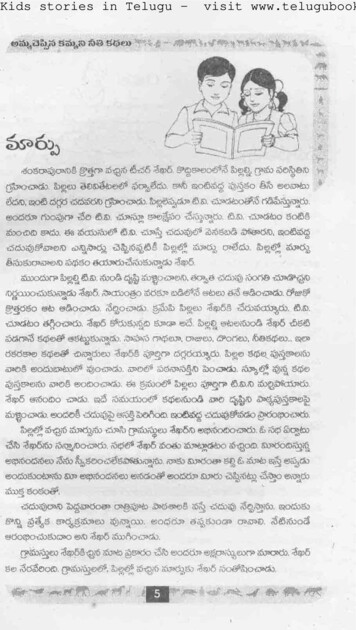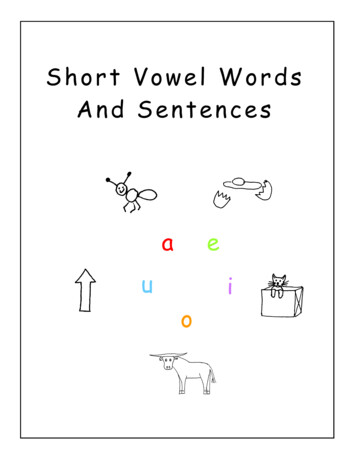
Transcription
2011Words and Their StoriesVOA Special EnglishSalarean.comSelf Study5/25/2011
Table of ContentA Chip on Your ShoulderAce in the HoleAll About EyesAll About NamesApple Pie Order When Everything Is Just PerfectBack to Basics Staying Down to EarthBack, Shoulders and ChestBaloney It's Just Not TrueBaseball Terms This Is a Whole New BallgameBelittle Thomas Jefferson First Used This WordBigwigBird WordsBuff Are You a Buff About SomethingCircus Some Agree It Is the 'Greatest Show on Earth'Clothing ExpressionsComputer Terms Have You Googled Someone LatelyDog TalkEasy As Falling Off a Log Not Much Effort Involved!English Expressions That Don't Pan OutFall GuyFarm ExpressionsFireworksCompiled by salarean.com for self-study only
From Couch Potato to Cabin FeverGet Your Act TogetherGolden Rules and Golden OldiesGreen Expressions'Hair' – More Than a Rock MusicalHave a HeartHeart to Heart Some Heartfelt ExpressionsHold Your HorsesHolding the BagHotheaded Hot ShotI Feel Very BlueIf a Student's Grades Hit Bottom, It Is Time to Hit the BooksIn the Red When a Business is Losing MoneyInsect ExpressionsLike a Rolling StoneLosing ItMaydayMilitary ExpressionsMoney TalksMoney, Part 1Money, Part 2Money, Part 3More Clothing ExpressionsCompiled by salarean.com for self-study only
More Expressions That Are Old and TrueMouth ExpressionsNuts and BoltsProverbs Ideas About How to LiveProverbs Some Listeners’ Favorite SayingsPulling a Fast OneSanta ClausSwan SongTake This Medicine The Story of the Sign 'Rx'The Answer Is as Clear as the Nose on Your FaceThe Cold, Hard RealityTo Buffalo To Win by Trick or ThreatTouching All Bases Baseball Rules!Two Heads Are Better Than OneWater Diving Into a Sea of TermsWhen the Cat’s AwayWhere Did 'OK' Come FromWildcatCompiled by salarean.com for self-study only
A Chip on Your ShoulderWhat it means when people are said to have a chip on their shoulders. Transcript of radiobroadcast:17 January 2010Now, the VOA Special English program WORDS AND THEIR STORIES.(MUSIC)Every week at this time we tell the story of words and expressions used in American English.Some of them are old. Some are new. Together, they form the living speech of the Americanpeople.Some popular expressions are a mystery. No one is sure how they developed. One of these isthe expression, carry a chip on your shoulder. A person with a chip on his shoulder is aproblem for anybody who must deal with him. He seems to be expecting trouble. Sometimeshe seems to be saying, “I’m not happy about anything, but what are you going to do aboutit?”A chip is a small piece of something, like a chip of wood. How did this chip get on a person’sshoulder? Well, experts say the expression appears to have been first used in the UnitedStates more than one hundred years ago.One writer believes that the expression might have come from an old saying. The sayingwarns against striking too high, or a chip might fall into your eye. That could be goodadvice. If you strike high up on a tree with an axe, the chip of wood that is cut off will fallinto your eye. The saying becomes a warning about the dangers of attacking people who arein more important positions than you are.Later, in the United States, some people would put a real chip on their shoulder as a test.They wanted to start a fight. They would wait for someone to be brave enough to try to hit itoff.The word chip appears in a number of special American expressions. Another is chip off theold block. This means that a child is exactly like a parent.This expression goes back at least to the early sixteen hundreds. The British writer of plays,George Colman, wrote these lines in seventeen sixty-two. “You’ll find him his father’s ownson, I believe. A chip off the old block, I promise you!”The word chip can also be used in a threatening way to someone who is suspected ofwrongdoing. An investigator may say, “We’re going to let the chips fall where they may.”This means the investigation is going to be complete and honest. It is also a warning that noone will be protected from being found guilty.Chips are often used in card games. They represent money. A poker player may, at any time,decide to leave the game. He will turn in his chips in exchange for money or cash.Compiled by salarean.com for self‐study only1
This lead to another meaning. A person who finished or died was said to have cashed in hischips. Which is a way of saying it is time for me to finish this program.(MUSIC)You have been listening to the VOA Special English program, Words and Their Stories. I’mWarren Scheer.Compiled by salarean.com for self‐study only2
Ace in the HoleTerms that come from card games. Transcript of radio broadcast:23 November 2009Now, WORDS AND THEIR STORIES, a program in Special English by the Voice ofAmerica.(MUSIC)It is surprising how many expressions that Americans use every day came from the cardgame of poker. For example, you hear the expression, ace in the hole, used by many peoplewho would never think of going near a poker table. An ace in the hole is any argument, planor thing kept hidden until needed. It is used especially when it can turn failure into success.In poker and most card games, the ace is the highest and most valuable card. It is often awinning card. In one kind of poker game, the first card to each player is given face down. Aplayer does not show this card to the other players. The other cards are dealt face up. Theplayers bet money each time they receive another card.No one knows until the end of the game whose hidden card is the winner. Often, the ace inthe hole wins the game.Smart card players, especially those who play for large amounts of money, closely watch theperson who deals the cards. They are watching to make sure he is dealing honestly. Theywant to be sure that he is not dealing off the bottom of the stack of cards. A dealer who isdoing that has stacked the deck. He has fixed the cards so that he will get higher cards. Hewill win and you will lose.The expression, dealing off the bottom, now means cheating in business, as well as in cards.And when someone tells you that the cards are stacked against you, he is saying you do nothave a chance to succeed.In a poker game you do not want to let your opponents know if your cards are good or bad.So having a poker face is important. A poker face never shows any emotion, never expresseseither good or bad feelings. No one can learn – by looking at your face – if your cards aregood or bad.People now use poker face in everyday speech to describe someone who shows no emotion.Someone who has a poker face usually is good at bluffing. Bluffing is trying to trick aperson into believing something about you that is not true.In poker, you bluff when you bet heavily on a poor hand. The idea is to make the otherplayers believe you have strong cards and are sure to win. If they believe you, they are likelyto drop out of the game. This means you win the money they have bet.Compiled by salarean.com for self‐study only3
You can do a better job of bluffing if you hold your cards close to your vest. You hold yourcards close to you so no one can see what you have. In everyday speech, holding your cardsclose to your vest means not letting others know what you are doing or thinking. You arekeeping your plans secret.We are not bluffing when we say we hope you have enjoyed today’s program.(MUSIC)This Special English program WORDS AND THEIR STORIES was written by Marilyn RiceChristiano. This is Bob Doughty.Compiled by salarean.com for self‐study only4
All About EyesA look at terms related to eyes. Transcript of radio broadcast:02 September 2009Now, the VOA Special English program WORDS AND THEIR STORIES.(MUSIC)Today’s program is all about eyes. When it comes to relationships, people’s eyes can be awindow into their hearts. This means that their eyes can tell a lot about how they feel. Wewill tell a story about a man and woman who are teachers at the same school. The woman isinterested in the man. She uses many methods to catch his eye, or get him to notice her.Once he sets eyes on her, or sees her, she might try to get him interested in her by actingplayful. In other words, she might try to make eyes at him or give him the eye.Let us suppose that this man gets hit between the eyes. In other words, the woman has astrong affect on him. He wants to spend time with her to get to know her better. He asks herout on a date.She is so happy that she may walk around for days with stars in her eyes. She is extremelyhappy because this man is the apple of her eye, a very special person. She might tell him thathe is the only person she wants, or “I only have eyes for you.”On their date, the couple might eat a meal together at a restaurant. If the man is really hungry,his eyes might be bigger than his stomach. He might order more food than he caneat. When his food arrives at the table, his eyes might pop out. He might be very surprisedby the amount of food provided. He might not even believe his own eyes. If fact, alleyes would be watching him if he ate all the food. This might even cause raisedeyebrows. People might look at the man with disapproval.During their dinner, the couple might discuss many things. They might discover that they seeeye to eye, or agree on many issues. They share the same beliefs and opinions. For example,they might agree that every crime or injury should be punished. That is, they firmly believe inthe idea of an eye for an eye. They might also agree that it is wrong to pull the wool over aperson’s eyes. This means to try to trick a person by making him believe something that isfalse. But the man and woman do not believe in the evil eye, that a person can harm you bylooking at you.The next day, at their school, the woman asks the man to keep an eye on, or watch theyoung students in her class while she is out of the classroom. This might be hard to do whenthe teacher is writing on a board at the front of the classroom. To do so, a teacher would needto have eyes in the back of his head. In other words, he would know what the children aredoing even when he is not watching them.Compiled by salarean.com for self‐study only5
All About NamesSome names have special meanings in popular American expressions. Transcript of radiobroadcast:06 February 2010Now, the VOA Special English program WORDS AND THEIR STORIES.(MUSIC)A person’s name is very important. Some names also have special meanings in popularAmerican expressions. To better understand what I mean, sit back and listen. You might evenwant to get a cup of Joe, I mean, a cup of coffee.One day, an average Joe was walking down the street. An average Joe is a common person –either male or female. This average Joe was lost. He did not know Jack about where he wasgoing. By this, I mean he did not know anything about where to find things in the city.So average Joe asked John Q. Public for directions to the nearest bank. John Q. Public isalso a common person – male or female.“Jeez Louise,” said John Q. Public. This is an expression of surprise. “Jeez Louise, don’t youknow that all banks are closed today? It is Saturday.”“For Pete’s sake,” said average Joe. This is also an expression used to show a feeling likesurprise or disappointment.“For Pete’s sake. I do not believe you,” said average Joe. He was being a doubting Thomas,someone who does not believe anything he is told.At that moment, Joe Blow was walking down the street with a woman. Joe Blow is also anexpression for a common man. Now this Joe Blow was NOT walking next to a plain Jane. Aplain Jane is a woman who is neither ugly nor pretty. She is simply plain. No, the womanwith Joe Blow was a real Sheila – a beautiful woman.Average Joe asked the woman if all banks were closed on Saturday. “No way, Jose,” sheanswered. This is a way of saying “no.” “No way, Jose. Many banks are open on Saturdays.”Average Joe did not know either of these two people from Adam. That is, he did not knowthem at all. But he followed their directions to the nearest bank.When he arrived, he walked to the desk of the chief bank employee. Now this man was atrue Jack of all trades. He knew how to do everything.“I am here to withdraw some money so I can pay my taxes to Uncle Sam,” said average Joe.Uncle Sam represents the United States government. The banker produced some papers andtold average Joe to sign his John Hancock at the bottom. A John Hancock is a person’ssigned name – a signature. Historically, John Hancock was one of the signers of the UnitedCompiled by salarean.com for self‐study only6
States Declaration of Independence. Hancock had a beautiful signature and signed his namelarger than all the others.As average Joe left the bank he began to sing. But sadly, average Joe was not a good singer.He was a Johnny One Note. He could only sing one note.(MUSIC)This VOA Special English program, WORDS AND THEIR STORIES, was written by JillMoss. I’m Faith Lapidus.Compiled by salarean.com for self‐study only7
Apple Pie Order: When Everything Is Just PerfectExpressions about apples. Transcript of radio broadcast:14 March 2009Correction attachedNow, the VOA Special English program, WORDS AND THEIR STORIES.Today we tell about the expression, "apple pie order." It means in perfect order, very wellorganized.Nobody is sure where and when the expression apple pie order began. Some say that Scottishand English writers used the expression a long time ago. Others say it first was used in thenortheastern American states known as New England.The housewives of New England cut their apples in even slices. Then they filled pie panswith them in an organized way, row upon row. As one writer said, the women of NewEngland loved to have everything in its place. This perhaps explains why it generally isbelieved that the expression apple-pie order began in New England.Another old expression describes the opposite condition – wild disorder. That expressionis apple of discord. It comes from ancient mythology.The myth says that all the gods and goddesses were sitting around the table to celebrate themarriage of Thetis and Peleus. One of the goddesses, Discord, was a troublemaker. Shethrew a golden apple on the table to be given as a prize to the most beautiful goddess.It was not an easy decision to make. How could they choose among Juno, Minerva andVenus. Paris was given the task of deciding. He decided to give the golden apple to Venus.Juno and Minerva were very angry and threatened him. This, the myth says, began the longTrojan war.At one time, the tomato was called a love apple. That was a mistake. This is how themistake happened.In the sixteenth century, Spain imported the tomato from South America after Spanishexplorers had landed there. Spain then exported the tomato to Morocco. Italian traderscarried it on to Italy. The Italian name for the tomato was pomo di Moro – apple of theMoors.When French growers imported it from Italy, they thought di Moro meant d'amour, theFrench word for love. And so pomo di Moro became the apple of love.People believe many things about the apple. One belief is that it has great powers of keepingpeople healthy. A very common expression is "An apple a day keeps the doctor away."Compiled by salarean.com for self‐study only8
Another belief is based on fact. The expression is "One rotten apple spoils the barrel."When an apple begins to go bad, it ruins all the other apples around it in the container. Theexpression has come to mean that one bad person in a group can cause everyone to act bad.(MUSIC)You have been listening to the VOA Special English program WORDS AND THEIRSTORIES. I'm Warren Scheer.Correction: An earlier version of this story incorrectly identified Discord as a Greek god;she was a goddess.Compiled by salarean.com for self‐study only9
Back to Basics: Staying Down to EarthSome expression about people who treat everyone fairly and with respect. Transcript ofradio broadcast:07 March 2009Now, the VOA Special English program, WORDS AND THEIR STORIES.Every week at this time, we tell about popular American words and expressions. Some ofthese are very old. Some are new. Together, they form the living speech of the Americanpeople.Today we tell about the expression "down to earth." Down to earth means being open andhonest. It is easy to deal with someone who is down to earth.A person who is down to earth is a pleasure to find. He or she accepts other people asequals. A down to earth person is the opposite of someone who acts important or proud.Down to earth people could be important members of society. But they do not considerthemselves to be better than others who are less important. They do not let theirimportance "go to their heads." Someone who lets something go to his head feels he isbetter than others. He has a "big head."A person who is filled with his own importance and pride is said to have "his nose in theair." Often the person who has a big head and his nose in the air has no reason to feel betterthan others. He surely is the opposite of someone who is down to earth.Americans use another expression that is similar in some ways to down to earth. Theexpression is "both feet on the ground." Some one with both feet on the ground is a personwith a good understanding of reality. She has what is called "common sense." She may havedreams. But she does not allow them to block her understanding of what is real.The opposite kind of person is one who has his "head in the clouds." Someone with hishead in the clouds is a person whose mind is not on what is happening in real life. Such aperson may be called a"daydreamer."Sometimes a person with his head in the clouds can be brought back to reality. Sharp wordsfrom a teacher, for example, can usually get a daydreaming student to put both feet on theground.The person who is down to earth usually has both feet on the ground. But the opposite is notalways true. Someone with both feet on the ground may not be as open and easy to deal withas someone who is down to earth.Compiled by salarean.com for self‐study only10
When we have both our feet firmly on the ground, and when we are down to earth we do nothave our noses in the air. We act honestly and openly to others. Our lives are like the groundbelow us – solid and strong.(MUSIC)This Special English program was written by David Jarmul. I'm Warren Scheer. Listenagain next week at this time for another WORDS AND THEIR STORIES program on theVoice of America.Compiled by salarean.com for self‐study only11
Back, Shoulders and ChestEnglish idioms that are head and shoulders above the rest. Transcript of radio broadcast:22 January 2010Now, the VOA Special English program WORDS AND THEIR STORIES.There are many American expressions that use parts of the body. These include the eyes,ears, nose, mouth and even the heart. Today we will tell you some expressions that use otherbody parts – the back, shoulders and chest.When I am facing a lot of pressure at work, my back and neck will start to hurt. Sometimes,this tension is the result of too much work. I have too many things to do because mysupervisor is on my back all the time. In other words, my employer is always telling me todo things.Sometimes, I want my employer to get off my back! I want her to stop criticizing me andmaking too many demands on my time. I can not say this, however. I would never turn myback on her and refuse to help when there is a need. If I did refuse to help, my supervisormight say bad things about me behind my back. She might criticize me when I am notpresent. This would surely be a stab in the back. It is never kind to unfairly harm or say badthings about other people.Sometimes, when I am very productive in my job, my employer gives me a pat on the back.She praises my work. She might even say “I will scratch your back if you willscratchmine.” This means she will do something for me, if I do something helpful for her inexchange. Such an offer usually comes straight from the shoulder. My supervisor has avery direct, open and honest way of speaking.I know that my employer carries a lot on her shoulders. She is responsible for many thingsat the office. And because she is so important, she sometimes gets to rub shoulders with thetop officials. She gets to spend time with some very important people.I believe the top official values my superior. He never gives her the cold shoulder. He isnever unfriendly to her. He always treats her like she is an important part of the organization.I also value my supervisor. In fact, I think she is very effective in her job. Of course, I couldyell my opinion at the top of my lungs, or as loudly as I possibly could. It might even feelgood to get my emotionsoff my chest. It is always helpful to tell people how you feel so thatyour emotions do not trouble you.But it is not necessary for me to praise my superior. Most of my co-workers feel the exactsame way about her. So, I think I will just save my breath. I will keep silent because talkingor repeating myself will not do any good.(MUSIC)Compiled by salarean.com for self‐study only12
Baloney: It's Just Not TrueExpressions used to describe false, wrong or foolish things.03 January 2009Now, the VOA Special English program, Words and Their Stories.(MUSIC)Baloney is a kind of sausage that many Americans eat often. The word also has anothermeaning in English. It is used to describe something – usually something someone says –that is false or wrong or foolish.Baloney sausage comes from the name of the Italian city, Bologna. The city is famous for itssausage, a mixture of smoked, spiced meat from cows and pigs. But, boloney sausage doesnot taste the same as beef or pork alone.Some language experts think this different taste is responsible for the birth of theexpression baloney. Baloney is an idea or statement that is nothing like the truth in thesame way that baloney sausage tastes nothing like the meat that is used to make it.Baloney is a word often used by politicians to describe the ideas of their opponents.The expression has been used for years. Fifty years ago, a former governor of New Yorkstate, Alfred Smith, criticized some claims by President Franklin Roosevelt about thesuccesses of the Roosevelt administration. Smith said, “No matter how thin you slice it, it isstill baloney.”A similar word has almost the same meaning as baloney. It even sounds almost the same.The word is blarney. It began in Ireland about sixteen hundred.The lord of Blarney castle, near Cork, agreed to surrender the castle to British troops. But hekept making excuses for postponing the surrender. And, he made them sound like very goodexcuses, “this is just more of the same blarney.”The Irish castle now is famous for its Blarney stone. Kissing the stone is thought to give aperson special powers of speech. One who has kissed the Blarney stone, so the story goes,can speak words of praise so smoothly and sweetly that you believe them, even when youknow they are false.A former Roman Catholic bishop of New York City, Fulton Sheen, once explained, “Baloneyis praise so thick it cannot be true. And blarney is praise so thin we like it.”Another expression is pulling the wool over someone’s eyes. It means to make someonebelieve something that is not true. The expression goes back to the days when men wore falsehair, or wigs, similar to those worn by judges today in British courts.Compiled by salarean.com for self‐study only13
The word wool is a popular joking word for hair. If you pulled a man’s wig over his eyes, hecould not see what was happening. Today, when you pull the wool over someone’s eyes, hecannot see the truth.(MUSIC)This VOA Special English program, Words and Their Stories, was written by MarilynChristiano. I’m Warren Scheer.Compiled by salarean.com for self‐study only14
Baseball Terms: This Is a Whole New BallgameExpressions from America's national pastime. Transcript of radio broadcast:11 April 2009Now, the VOA Special English program, Words and Their Stories.Baseball is America’s national sport. So it is not unusual that many popular expressionscome from baseball. But first, let me explain a little about the game.Each baseball team has nine players. The pitcher of one team throws the ball to a batter fromthe other team. The batter attempts to hit the ball. If he misses, it is called a strike. If abatter gets three strikes, he loses his turn at bat and is called out. The batter also is out if hehits the ball in the air and an opposing player catches it. But if the batter hits the ball and it isnot caught, the batter tries to run to one or more of the four bases on the field. The batter canrun to all four bases if he hits the ball over the fence or out of the ballpark. Such a hit iscalled a home run.Now, here are some common expressions from baseball. Someone who is on the ball isintelligent and able to do a good job. But a person who threw a curve ball did somethingunexpected. Someone who steps up to the plate is ready to do his or her job. A pinchhitter takes the place of someone else at a job or activity.A person who strikes out or goes down swinging attempted something but failed. We alsomight tell the person that three strikes and you are out. But someone who hit a homerun or hit itout of the park did something extremely well.Sometimes I have to give information quickly, without time to think it over. Then I wouldsay something right off the bat. If someone is doing an extremely good job and is verysuccessful, you might say he or she is batting one thousand.If I say I want to touch base with you, I will talk to you from time to time about somethingwe plan to do. I might say I touched all the bases if I did what is necessary to complete ajob or activity. And if Icovered my bases I was well prepared. However, someone whois way off base did something wrong or maybe even dishonest or immoral. A person withstrange ideas might be described as out in left field.Let us say I want to sell my car but I do not know exactly how much it is worth. If someoneasks me the price, I might give a ballpark figure or a ballpark estimate.If someone offers me an amount that is close to my selling price, I might say the amount is inthe ballpark. However, if I say we are not in the same ballpark, I mean we cannot agreebecause my ideas are too different from yours.Finally, when a situation changes completely, we say that is a whole new ballgame.(MUSIC)Compiled by salarean.com for self‐study only15
Belittle: Thomas Jefferson First Used This WordThe third president of the United States was not to be belittled. Transcript of radio broadcast:30 January 2009Now, the VOA Special English program, Words and Their Stories.Today’s word is belittle. It was first used by Thomas Jefferson, the third president of theUnited States.Many years ago, a French naturalist, the Count de Buffon, wrote some books about naturalhistory. The books were a great success even though some critics did not like them. Somecritics said, “Count Buffon is more of a poet than a scientist.”Thomas Jefferson did not like what the Count had said about the natural wonders of the NewWorld. It seemed to Jefferson that the Count had gone out of his way to speak of naturalwonders in America as if they were unimportant.This troubled Thomas Jefferson. He, too, was a naturalist, as well as a farmer, inventor,historian, writer and politician. He had seen the natural wonders of Europe. To him, theywere no more important than those of the New World.In seventeen eighty-eight, Thomas Jefferson wrote about his home state, Virginia. Whilewriting, he thought of its natural beauty and then of the words of Count de Buffon. At thatmoment, Jefferson created a new word – belittle. He said, “The Count de Buffon believesthat nature belittles her productions on this side of the Atlantic.”Noah Webster, the American word expert, liked this word. He put it in his English languagedictionary in eighteen-oh-six. ‘Belittle – to make small, unimportant.’Americans had already accepted Jefferson’s word and started to use it. In seventeen ninetyseven, the Independent Chronicle newspaper used the word to describe a politician the papersupported. “He is an honorable man,” the paper wrote, “so let the opposition try to belittlehim as much as they please.”In eighteen forty-four, the Republican Sentinel of Virginia wrote this about the oppositionparty: “The Whigs may attempt to belittle our candidates that is a favorite game oftheirs.”In eighteen seventy-two, a famous American word expert decided that the time had come tokill this word. He said, “Belittle has no chance of becoming English. And as morecritical writers of America, like those of Britain, feel no need of it, the sooner it isforgotten, the better.”This expert failed to kill the word. Today, belittle is used, not only in the United States andEngland, but in other countries where the English language is spoken. It seems that efforts tobelittle the word did not stop people from using it.Compiled by salarean.com for self‐study only16
BigwigTerms for people who are powerful, at least in their own minds. Transcript of radiobroadcast:28 November 2009Now, the VOA Special English program WORDS AND THEIR STORIES.(MUSIC)Some expressions describe people who are important, or who at least think they are. Onesuch expression is bigwig.In the seventeenth century, important men in Europe began to wear false hair, called wigs. Asyears passed, wigs began to get bigger. The size of a man's wig depended on how importanthe was. The more important he was -- or thought he was -- the bigger the wig he wore. Somewigs were so large they covered a man's shoulders or back.Today, the expression bigwig is used to make fun of a person who feels important. Peoplenever tell someone he is a bigwig. They only use the expression behind his back.Big wheel is another way to describe an important person. A big wheel may be the head of acompany, a political leader, a famous movie star. They are big wheels be
Now, the VOA Special English program WORDS AND THEIR STORIES. (MUSIC) Every week at this time we tell the story of words and expressions used in American English. Some of them are old. Some are new. Together, they form the living speech of the American people. Some popular expressions are a mystery. No one is sure how they developed. One of .










